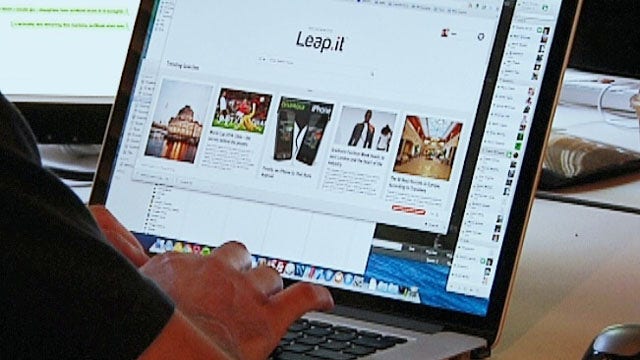Social Searching: Site Wants to Change How You See the Web
A new search engine wants to change the way you browse the web. It's called Leap.It and they think they've created an innovative approach to online search by making it a social network. It's search that's curated through user collaboration.
Leap.It is one of the founding companies in the Kansas City Startup Village. It began as a mobile search app, but this year they focused on their computer-based platform with plans to update the mobile app later. They want to change how people get their information and call their way a "holistic and visual search experience."
"We're combining visual search results with real-time signaling, so at its core we're actually turning search into a social network," said Leap.It CEO Mike Farmer.
Search results are similar to other search engines but in addition, they also get trending topics and real- time updates pulled from social media sites.
Users help drive what makes the top of the results list by creating "Perspectives." They're lists that people create for a certain topic with what they think are the top search results. Leap.It is meant to be a collaborative effort, so as other users add articles to the Perspectives and agree with their relevance, those search results move higher up in the list.
On the initial search page, Leap.It (hyperlink: Leap.it) there is a search bar for the user to type in a subject, or they can scroll down and see all the trending topics of the day. If you click on the topic, it'll direct you to a search results page with related searches, other user's Perspectives, articles, and webpages.
The most noticeable difference is instead of blue links in a list like you would see on Google or Yahoo, users get photos and videos when they search a topic. Tyler VanWinkle is head of Product Developing and Marketing for Leap.It. He said they got tired of seeing the same design on every search engine.
"While the rest of the web has generated content that continues to look better and better and is sexier and sexier and more spiced up, the entry point to all that content is largely the same, it's a blue link with a snippet," said VanWinkle.
The design is similar to social networks like Pinterest, Twitter and Facebook. Users are able to see what's happening online right away. And like Pinterest, each result has a photo or video with it.
Another noticeable difference is Leap.It's lack of sponsored content. They believe that people are better than machines at picking top search results and do not sell top search result spots to advertisers.
"Us knowing what the best set of results are, we think is far beyond or far surpasses any kind of machine-based learning," said VanWinkle.
Farmer thinks the Leap.It collaborative model will prevent companies from going in and creating positive lists of themselves - because others have to agree with the Perspective for it to become a popular result. This, he hopes, will mean fairer and more accurate results.
Leap.it saw over a million users in its first four weeks. And although it's still small compared to big name search engines, they hope this now small innovation could eventually take on web giants.




















